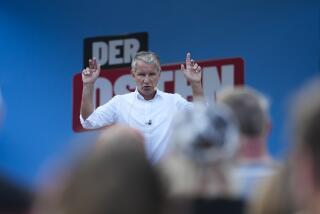Turkish Secularists Lead Vote, but Far Right Surges
- Share via
ANKARA, Turkey — Prime Minister Bulent Ecevit’s secular party was leading Turkish elections Sunday, but an ultra-rightist group appeared to be making big gains.
According to early results, the Islamic Virtue Party--the largest party in parliament--suffered a major drop in votes. Analysts said the party’s friction with the staunchly secular military might have led voters to abandon it and choose the ultranationalist movement, which is also deeply religious.
With 50% of the vote counted, Ecevit’s Party of the Democratic Left had 23% of the vote. Ecevit appeared to be picking up votes from people angry over constant scandals that have plagued previous governments.
“I am happy with this result,” Ecevit said. “I think the period of using religion for political purposes is over.”
Virtue was taking only 16% of the vote, down from the 21% that its predecessor, the Welfare Party, garnered in 1995 to win parliamentary elections and eventually take power before being pushed out by the military.
The Nationalist Action Party was taking 18% of the vote. In 1995, the party did not pass the 10% mark necessary to gain seats.
Known as the MHP, the ultranationalist party, which will probably be part of a future coalition, calls for no compromise with Kurdish activists and appears to have benefited from the mid-February capture of Kurdish guerrilla leader Abdullah Ocalan.
MHP leader Devlet Bahceli appeared surprised by his party’s strong gains. People “were forced to make a new choice” because of instability in the government and political corruption, he said.
In Istanbul, overjoyed ultranationalists took to the streets, waving the party’s three-crescent flag and chanting, “Stand Kosovo, we are coming!”
The plight of the hundreds of thousands of mostly Muslim ethnic Albanians who have fled Kosovo, a southern province of Serbia, the dominant republic in Yugoslavia, is a deeply emotional issue in Turkey. Turks ruled the Balkans for hundreds of years during the Ottoman Empire, and millions of Turks have Balkan ancestry.
Turkey has had six governments since 1995. An unstable coalition government would make it difficult for the country, a member of the North Atlantic Treaty Organization, to tackle economic reforms and would also undermine its push to join the European Union.
All of the major secular parties agree on the need for a pro-Western foreign policy and economic privatization. The major parties also all support membership in NATO and participation in its air operations against Yugoslavia.
The votes for the ultranationalists are spread over vast areas of central Anatolia, whereas support for Ecevit’s party is concentrated in cities. By a quirk of the electoral system, the MHP could yet win the most seats in parliament despite lagging Ecevit in percentage terms.
More to Read
Sign up for Essential California
The most important California stories and recommendations in your inbox every morning.
You may occasionally receive promotional content from the Los Angeles Times.













